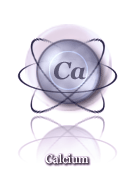Calcium - deficiency, dosage, foods, sources and medical uses

Calcium is well-known preventive element suppressing the osteoporosis process, lowering high blood pressure, slowing down the large intestine cancer progress. Modern food is not rich in calcium. Adults are recommended to use proper dietary supplements to prevent from this mineral insufficiency. The most frequent form of this mineral is calcium carbonate, citrate, gluconate, phosphate, or lactate. For example, calcium carbonate contains 40 % of pure calcium, gluconate contains only 9 %. The lower the calcium content is, the more tablets are needed to use. Calcium is an essential component of bones and teeth, and partakes in many for life important processes in the organism.
Calcium – utilization
Calcium nourishes bones and teeth, prevents from bone marrow loss and osteoporosis, and regulates heart palpitation and other muscles. Prevents form nerve system and blood coagulation failure. In case of hypertonic disorder, calcium lowers the blood pressure. This mineral is also beneficial for proper digestion.
Calcium – benefits and effectiveness
Most of the calcium in the organism is stored in bones and teeth. Some of the mineral is stored in blood plasma. It partakes in production of many enzymes and hormones which regulate digestion process and metabolism. Calcium is essential for normal transport of nutrients through membranes, blood coagulation, lesions healing, and muscle functioning. If the organism suffers from calcium insufficiency, it begins to supply various processes with calcium contained in bones. In this case, bones become fragile and the marrow rarefaction begins.
Prevention: Sufficient intake of calcium is one of the critical factors in prevention and therapy of osteoporosis. Some studies had shown, daily income of calcium dietary supplements or food rich in this mineral helps to thicken bones and lower the risk of fractures for people over the age of 65 years old.
Other benefits: Calcium probably lowers the risk of intestine cancer. Some scientists confirm, food rich in calcium, especially fruits and vegetables reduces high blood pressure with the same effectiveness as classic medicaments.
Calcium – recommended dosage
The recommended daily dosage of calcium differs according to various institutes and countries. In the USA, the recommended dosage is 1000 mg for both men and women in the age between 19 and 50 years old. The dose of 1200 mg is recommended for older people. In the Czech Republic, it is recommended to use 800 mg of calcium per day.
Calcium insufficiency: Long term calcium insufficiency might cause bone illnesses such as osteoporosis. Low level of calcium might evoke muscular tension and convulsions.
Calcium surplus: The combination of dietary supplements usage together with food rich in calcium excessive intake reaching the dose of 2500 mg of calcium is still safe for human organism. However, excessive dosage of calcium might have an influence on the absorption of other minerals such as ferrum and magnesium. Long term overdosing might also initiate renal stones. Calcium carbonate high doses might cause flatulency and habitual constipation. If one experiences such difficulties, he should try to calcium citrate.
Calcium – usage suggestions
Person should control its calcium daily intake to be about 800 mg of calcium every day. No matter if the amount will be contained in dietary supplements or in food. It is recommended to add magnesium to the usage of calcium.
It is advised to split the doses into smaller (not higher than 600 mg each) doses and use them with a meal to fasten the absorption.
Calcium – sources
Milk products such as yoghurt, milk, cottage and cheese are the most known and effective sources of calcium. Low fat and none fat products have also high percentage of calcium content. Other sources of this mineral are orange juice, broccoli, or almonds.
Calcium – facts and recommendations
- Do not use calcium produce from dolomite, oyster shells or bone powder. These compounds might contain excessive amount of lead.
- It is strongly recommended to use the same amount of vitamin D while using calcium dietary supplements.
- Spinach is not a good source of calcium because it contains many oxalates, substances that inhibit calcium absorption.
Calcium - warnings
Patients suffering from thyroid gland or kidney failure should consult the usage of calcium with their physician. Calcium dietary supplements might have an influence on the effectiveness of certain antibiotics. If one experiences any health difficulties, he should consult using dietary supplements with his physician.
Calcium – additional information
100 g of cooked broccoli contains about a half of the recommended daily dosage of calcium for adults.